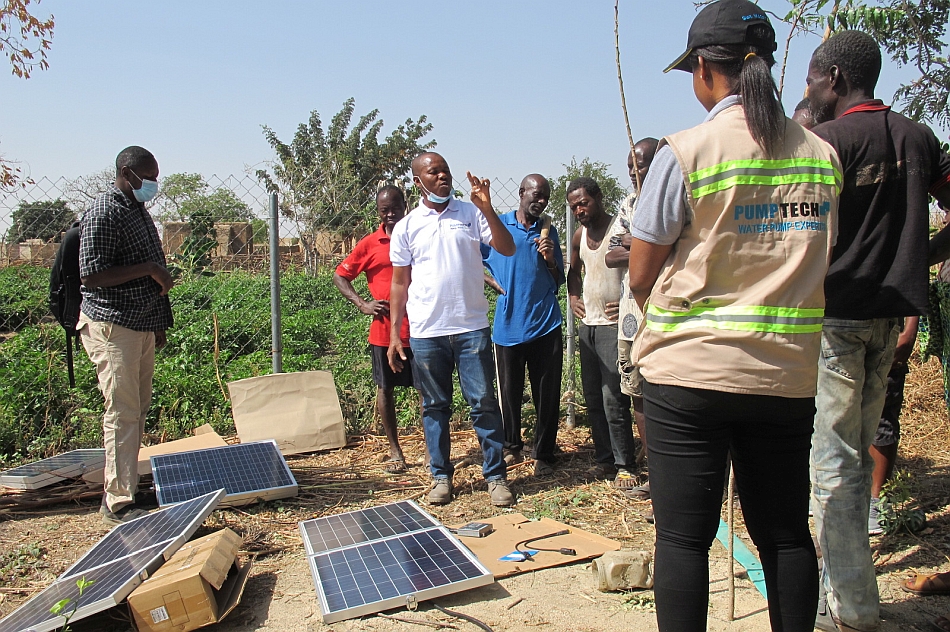‘Know your customers’ is arguably the first rule of marketing. By identifying and segmenting customer groups, companies can target their products and services to the right people, in the right way. This can open-up opportunities for growth, inform product development and improve customer retention.
But market segmentation is also easy to get wrong, often because of a lack of research and data. In Ghana, the International Water Management Institute (IWMI) is working with solar pump manufacturers and suppliers, farmers and other stakeholders in irrigated agriculture to boost the adoption of solar technologies that meet target users’ needs.
In many off-grid areas, petrol and diesel pumps are commonly used for irrigation. However, they are expensive to run and contribute to environmental pollution.
With the abundance of sunshine in Ghana, solar pumps offer small farmers a promising alternative – if they can afford the initial investment. To begin addressing this issue, IWMI joined forces with Pumptech, a distributor of solar pumps manufactured by the German company LORENTZ.
The pumps are designed for off-grid water pumping and several models are specifically aimed at smallholders.
Focusing on Ghana’s Upper East Region, which experiences high rainfall variability, IWMI then conducted a survey to determine the market potential for the pumps.
Four market segments were identified among smallholders: resource-rich farmers, mobile farmers (who rent land each season), resource-limited individual farmers (who have permanent access to cultivated land) and groups of farmers (who are interested in investing in solar-powered irrigation but need time and self-organization).
Each segment is slightly different in terms of the amount of water needed, land access, pump preferences and capacity to pay for the technology.
Pumptech shared these insights during a meeting on market segmentation and the suitability of solar pumps for small-scale irrigation. The meeting is part of an ongoing series of multi-stakeholder dialogues in Ghana and Ethiopia.
Initiated in 2019 by IWMI under the USAID-funded Feed the Future Innovation Lab for Small-Scale Irrigation (ILSSI), the dialogues bring together relevant actors to facilitate and accelerate farmer-led irrigation development both nationally and globally.
Customized solar suitability maps
Another insight that emerged was the benefits of customized solar suitability maps for business growth. In 2018, IWMI began mapping solar irrigation suitability in Ethiopia. These maps pinpointed areas for smallholder farmers to introduce solar irrigation without depleting water resources.
IWMI then refined the mapping framework to produce an online interactive tool for sub-Saharan Africa. Geospatial information on high-potential locations for solar irrigation pumps is now available for the entire region.
Most recently, IWMI has been working with solar manufacturing and distribution companies to demonstrate how the maps and tools can be customized and incorporated into companies’ sales zoning and marketing strategies.
One of these companies is PEG Africa, which operates in Ghana, Côte d’Ivoire, Mali and Senegal. Using the maps, PEG Africa identified the areas of biggest opportunity for its pumps, based on water resource type and depth, and adapted its marketing strategy to focus on these areas.
The maps are also being used in Ethiopia by companies such as Rensys. But during a similar multi-stakeholder meeting organized with the World Bank’s 2030 Water Resources Group, stakeholders noted that the limited supply of solar pumps in Ethiopia is holding back market expansion.
Price is an issue, too. This is despite the government making agricultural water technologies tax exempt in 2019. It is hoped that the country’s soon-to-be-published National Water Policy and Strategy, which incorporates several IWMI recommendations, will remove many of these bottlenecks.
Making solar technologies inclusive
An area that participants at both events agreed needs extra attention is ensuring solar irrigation technologies are inclusive. Women in particular, are more likely to face difficulties accessing resources such as land, credit and information that would enable them to invest in irrigation.
As a first step to making solar pumps more accessible, IWMI has partnered with farmers and private companies to test innovation bundles that combine pumps with financing models like pay-as-you-own.
This model allows farmers to use the irrigation equipment while making regular payments until the total cost of the pump is paid off. Payments may be weekly, monthly, quarterly or scheduled around harvest times when cash flow is highest.
IWMI is currently working with several companies in West and East Africa to refine this payment plan, so that it can be tailored to each client, including women and resource-poor farmers.
Other companies interested in helping to expand small-scale irrigation in Africa and beyond are encouraged to get in touch.


